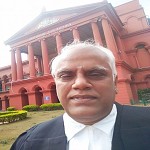Would my application be allowed???

Querist :
Anonymous
(Querist) 18 December 2010
This query is : Resolved
I filed a case of 138 NIA,which was dismissed.
The defendant filed a case of malicious prosecution against me seeking damages of Rs. Three Lakhs declaring that his licence as a registered Contractor of CPWD could not be renewed due to that case of 138 NIA filed by me.
Recently I filed a RTI to CPWD seeking info that why his licence was not renewed.To which they replied that he never applied for any license.
The case of malicious prosecution filed by him is now scheduled for "Defendant Evidence".I have filed that RTI and its reply with the court under order 8 rule 1-A (3) read with section 151 CPC.
My application is being opposed by my opponent.
Please tell whether at this stage,my application would allowed in the Court and kept on record or not ??
Today there was argumentation for the maintainability of this application of mine ,to which the judge has taken a time of next one month for deciding.
Is there any thing which I should do so that my application be taken on Court's record?
 Y V Vishweshwar Rao
(Expert) 18 December 2010
Y V Vishweshwar Rao
(Expert) 18 December 2010
The Application to Received a Document which is dated after filing he Suit and After filing your Pleadings / Written statement , and it is important document to decide the Issues in the Suit . A document available to parties after after filing the pleadings will be receive by the Court.
 Advocate. Arunagiri
(Expert) 18 December 2010
Advocate. Arunagiri
(Expert) 18 December 2010
At any stage this appln can be filed. The court will normally allow the petition, if you disclose full description of the document and the relevancy of the document to this case.

Querist :
Anonymous
(Querist) 18 December 2010
Mr Vishweshwar Rao, Thanks that u answered, but the judge does not seems favoring me.
Can U help me in getting some citation.
One thing ,i forgot that the RTI was filed by my Bhabhi not me,hence the opponent is taking a plea that how can a person stranger to the present lawsuit be entertained by the Court.
Please help me further.
 Parthasarathi Loganathan
(Expert) 18 December 2010
Parthasarathi Loganathan
(Expert) 18 December 2010
RTI Act relates to Bonafide Information furnished and not the Applicant. Hence you will surely take this point. However it will also depend upon as to how your counsel argue the matter pressing this aspect.

Querist :
Anonymous
(Querist) 18 December 2010
Mr. Parthasarthi,sir,I could not understand your point.
please elaborate in layman's language.
 SAANJAAY GUPTAA
(Expert) 18 December 2010
SAANJAAY GUPTAA
(Expert) 18 December 2010
file an application U/S 311 Cr.P.C before the same court seeking permission to adduce more defence witness mentioning the name of the person issued the RTI information to you or your relative to bring facts to just decision of the court. The same document proved by the person issued and marked as exhibit in your case. Lot of Judgement on 311 Cr.P.C.
 Raj Kumar Makkad
(Expert) 18 December 2010
Raj Kumar Makkad
(Expert) 18 December 2010
I am in complete agreement of Sanjay Gupta. Why not bring the supplier of the information under RTI Act in your defense evidence under section 311 Cr. P. C. to end all controversy of your Bhabhi or maintainability. Information cant be changed at this stage so take benefit of that section.
 Advocate Bhartesh goyal
(Expert) 18 December 2010
Advocate Bhartesh goyal
(Expert) 18 December 2010
Mr Sanjay, Anonymous query is regarding civil case i.e malicious prosecution and not regarding criminal case.s 311 of Cr.P.c not applicable.Mr. Rao and Mr.Arungiri are right.
 s.subramanian
(Expert) 18 December 2010
s.subramanian
(Expert) 18 December 2010
Mr.Arunagiri is right.If your petition is not allowed,you have the alternative way to do it by summoning the RTI witness diretly to produce your query and the reply.
 Parveen Kr. Aggarwal
(Expert) 18 December 2010
Parveen Kr. Aggarwal
(Expert) 18 December 2010
Mr. Anonymous,
Order 8, Rule 1-A of the Code of Civil Procedure, 1908 applies only to documents in possession of the defendant and not to the documents not in possession of the defendant but in possession of a government office like CPWD.
As you have stated that the suit is fixed for defendant's evidence, you may summon the document from the concerned office under Order 16, rule 6 of the CPC.
"6. Summons to produce document: Any person may be summoned to produce a document, without being summoned to give evidence, and any person summoned merely to produce a document shall be deemed to have complied with the summons if he causes such document to be produced instead of attending personally to produce the same."
 Devajyoti Barman
(Expert) 19 December 2010
Devajyoti Barman
(Expert) 19 December 2010
Yes the said provision s applicable to your case.

Querist :
Anonymous
(Querist) 19 December 2010
Mr Parveen,thnx that U replied,but sir,We applied for a RTI application and got the reply also now these documents were i our hands that is why we opted for rder 8, Rule 1-A of the Code of Civil Procedure, 1908.
Are we wrong???
I think if we are to call CPWD for bringing its record then we can call it under Order 16, rule 6 of the CPC.
Am I right or wrong ,please suggest.????
 Parveen Kr. Aggarwal
(Expert) 19 December 2010
Parveen Kr. Aggarwal
(Expert) 19 December 2010
Mr. Anonymous,
The document, i.e. the reply cannot be termed as a public document and is not per se admissible. You have to prove the copy obtained under the RTI Act by getting the original produced for the inspection of the court. The original is not in your possession and you possess only a copy thereof. Without the original being produced in the court, the copy in your possession will not be proved.

Querist :
Anonymous
(Querist) 19 December 2010
Mr Parveen we have filed the original copy of the reply received by us but do mean that this is not the original copy and the original is with the CPWD only and our copy can be proved by calling CPWD's original copy only ???
Does that mean that we should summon the document from the concerned office under Order 16, rule 6 of the CPC only.
Have not we ran out the time already as the case is scheduled for Defendant (Ours) Evidence right now ???
 Parveen Kr. Aggarwal
(Expert) 21 December 2010
Parveen Kr. Aggarwal
(Expert) 21 December 2010
Mr. Anonymous,
You will have to summon an official from the office of CPWD who only can depose that the letter of reply was issued from their office. The reply is not per se admissible in evidence. The document cannot be admitted in evidence merely on your tendering it in the court. You will have to prove it. The official in support will have to bring the concerned record. The requirement of law is that the other party must get an opportunity of cross-examination.
As the case is fixed for your evidence, it is appropriate time for you to summon the witness and lead your evidence by producing oral as well as documentary evidence.
 Querist :
Anonymous
(Querist) 18 December 2010
This query is : Resolved
Querist :
Anonymous
(Querist) 18 December 2010
This query is : Resolved
 Querist :
Anonymous
(Querist) 18 December 2010
Querist :
Anonymous
(Querist) 18 December 2010
 Querist :
Anonymous
(Querist) 18 December 2010
Querist :
Anonymous
(Querist) 18 December 2010
 SAANJAAY GUPTAA
(Expert) 18 December 2010
SAANJAAY GUPTAA
(Expert) 18 December 2010
 Parveen Kr. Aggarwal
(Expert) 18 December 2010
Parveen Kr. Aggarwal
(Expert) 18 December 2010
 Querist :
Anonymous
(Querist) 19 December 2010
Querist :
Anonymous
(Querist) 19 December 2010
 Parveen Kr. Aggarwal
(Expert) 19 December 2010
Parveen Kr. Aggarwal
(Expert) 19 December 2010
 Querist :
Anonymous
(Querist) 19 December 2010
Querist :
Anonymous
(Querist) 19 December 2010
 Parveen Kr. Aggarwal
(Expert) 21 December 2010
Parveen Kr. Aggarwal
(Expert) 21 December 2010
